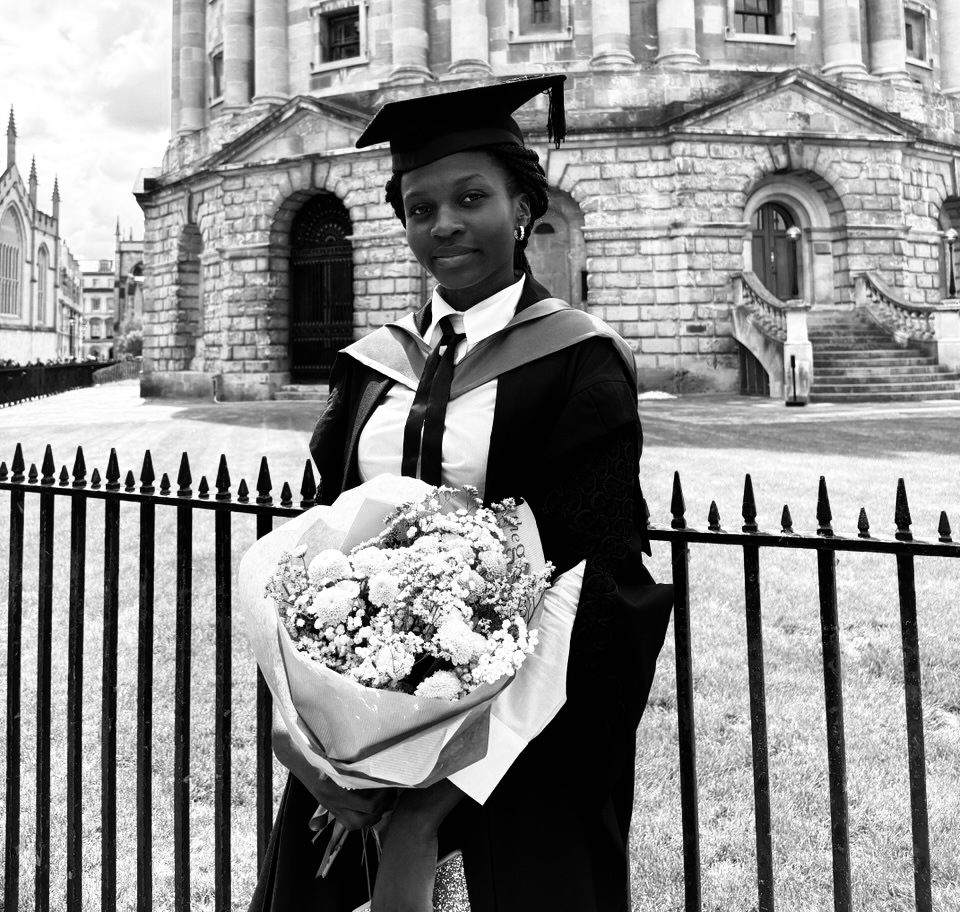






You recently graduated from the University of Oxford with an MSc in Law and Finance as a Mastercard Foundation Scholar, a rare and prestigious feat. Can you take us back to the moment you first dreamed of Oxford, and what it felt like to finally wear that graduation gown?
Early in my education, attending the University of Oxford was not something I could consider. I still remember when I was having a conversation with a senior colleague in 2016 and he told me that “You know, you could get into Oxford.” My first reaction was to laugh because Oxford did not look like a place meant for someone like me.
However, with time and with the right encouragement, I began to see things differently. I started to nurse the possibility. It stopped being about whether I belonged there, and more about the kind of value I could bring if given the chance. So, when I finally walked across the stage in that Oxford gown, it was beyond the degree, it was about my story of persistence, consistency, and daring to believe in opportunities that once felt out of reach.
At Ahmadu Bello University, you achieved the highest CGPA ever recorded in the Faculty of Law since 1962, and later secured a First-Class at the Nigerian Law School. How did you maintain such unwavering academic excellence at every stage?
To be honest, it was not easy. There were moments when the workload was overwhelming, but what kept me going were my concrete goals. At the start of each semester, I would write down exactly what I wanted to achieve and revisit those goals regularly. That simple habit gave me direction whenever distractions came.
Also, I made it a point to treat every course, test and assignment as important. I approached each task diligently because I knew it contributed to the bigger picture. Over time, this persistent hard work added up. At the end of the day, resilience, goal-setting, discipline, and refusing to let setbacks derail me played important roles in my success story.
You’ve attributed your success to “nothing short of God’s grace.” How has faith influenced your resilience and ambition, especially when facing academic or professional challenges?
My Christian faith is at the centre of my life. It gives me direction and the confidence to approach challenges without fear in my academic and professional life. For instance, during my studies at Ahmadu Bello University, there were occasions when I gave my best but did not get the results I expected. In those moments, I leaned on God for strength, reminding myself that if He wills my success, no obstacle whether institutional or structural can stop it. When I graduated with First-Class Honours in Law, becoming the first woman to earn that distinction in the faculty since its inception in 1962, I knew that above all, my faith in God had carried and sustained me.
During your time at Aluko & Oyebode, you worked on high-stakes, cross-border transactions involving multinational corporations and top-tier financial institutions. How does this experience impact your future self?
At Aluko & Oyebode, I rotated between the dispute resolution team and the banking and finance department, which gave me broad exposure to the firm’s work. If I had to pick one project that taught me the most, it would be difficult because every transaction came with its own unique pressure. In a top-tier firm, the environment is fast-paced, deadlines are tight, and client expectations are understandably high.
I had to learn how to balance what was legally sound, commercially viable, and aligned with the client’s objectives, while still meeting strict timelines. This required focus, discipline, and adaptability. Over time, I made it a habit to stay calm under pressure, think strategically, and maintain the quality of my work no matter how intense the pressure became. That has been one of the most valuable takeaways from my time at the firm, and it continues to shape how I approach tasks today.
Your career thrives at the intersection of law, finance, and development. How do you believe this synergy can transform Africa’s economic and governance landscape in the next decade?
I am driven by the intersection because of its ability to improve lives and transform societies. Law provides the structure for order and governance, finance mobilises the capital needed to drive growth, and development ensures those investments translate into real improvements in infrastructure, institutions, and communities.
When these three areas come together, they create systems that are both efficient and sustainable. For instance, strong legal frameworks can promote private capital for sustainable infrastructure projects, while development priorities can guide policies to ensure resources reach the communities that need them most.
Over the next decade, I believe this synergy will accelerate economic growth, strengthen governance, and expand opportunities across the continent. My ambition is to support the development and implementation of legal and policy frameworks that bring these areas together to create lasting social and economic impact.
Many aspiring scholars dream of studying at Oxford but find the application process daunting. Could you walk us through how you approached the process from preparation to securing the Mastercard Foundation Scholarship?
The application process and securing a scholarship such as the Mastercard Foundation Scholarship can feel daunting, but it is achievable with the right mindset and preparation. For me, the journey began with belief: belief in the possibility and in myself, even when present realities did not seem to support it. The next key was preparation. I started early: contacting referees, drafting and refining my personal statement, and thoroughly researching the programme long before applications opened. The more time you give yourself, the stronger and more confident your application will be. I also leaned on mentors and peers who reviewed my work and offered feedback.
Beyond preparation, I approached the process with strategy. I mapped it out in stages: first clarifying the country where I wanted to study, then narrowing my search to specific institutions, and finally identifying the programme that best aligned with my long-term goals. At the same time, I prioritised funding and focused on opportunities that offered support. Throughout the process, my faith was at the centre. Trusting God gave me resilience when the process felt overwhelming and peace when the outcome seemed uncertain. In a nutshell, it was a blend of self-belief, early preparation, supportive networks, and faith.
Despite an intense career, you remain deeply engaged in empowerment and social impact. What keeps you committed to causes beyond your professional work, and how do you make the time?
What keeps me committed is the sense of fulfillment I find in helping others. There is something profoundly rewarding about contributing to someone else’s journey and seeing them move towards their goals.
In terms of time, I have learned to integrate service into my life rather than treat it as something separate. Sometimes that takes the form of structured initiatives, but often it is through small, informal acts like reviewing a student’s CV, sharing an opportunity, offering encouragement, or simply being available to listen. I believe the world becomes better when we lift one another up, and even these small acts of kindness can go a long way in contributing to someone else’s success.
As someone who mentors young talents, what are the three biggest misconceptions law students or early-career lawyers have about success?
The first is that your background largely determines your future. Many assume that unless you come from a wealthy or influential family, your chances of success are limited. That is not true. In fact, coming from a humble background can sometimes open doors to opportunities and scholarships designed to support talent. What really matters is how you tell your story and the effort you put into your journey.
The second is that one failure means the end of the road. I experienced something similar before Oxford, when I applied to Cambridge. Although I was admitted, I did not secure funding. It was disappointing, but instead of giving up, I reflected, improved, and tried again. Many young lawyers stop after a single setback, but resilience, learning, adapting, and trying again make the difference in the long run.
The third is believing that everyone else has it all figured out. It is easy to feel like you are the only one uncertain about your path, especially when comparing yourself to peers or social media. The truth is that most people are figuring things out as they go. Life is rarely as polished behind the scenes as it appears online. My advice is: stay focused, do your best, trust God, and take it one step at a time. Your path will align.
Having studied law in Nigeria and completed postgraduate studies at one of the world’s leading universities, how would you compare the teaching and learning cultures?
That is a great question. In Nigeria, there is a strong emphasis on mastering the law and applying it to specific scenarios. This approach provides a solid technical foundation.
The approach at the University of Oxford complements this foundation but requires broader analytical skills. Students are encouraged not just to know the law, but to evaluate multiple perspectives, propose solutions, and develop independent judgment. It is about training the mind to look beyond the text and consider the wider societal and economic impact of legal frameworks.
If you could give one piece of advice to a young African aspiring to follow in your footsteps blending legal expertise, financial acumen, and social responsibility what would it be?
Dream big and do not shrink. Your aspirations, whether studying at Oxford or Harvard, or contributing to global institutions like the World Bank, IMF, or WTO, are achievable. Take consistent steps toward your goals, work hard, stay grounded in purpose, support others along the way, and never give up on the future you are capable of creating.

Article
September 30, 2025
From Victory to Forfeiture: FIFAs Strict Liability and Its Impact on Sports Law in Africa
The principle of strict liability in football disciplinary proceedings has once again come to the fo...

Article
April 15, 2025
THE IMPACT OF MERGERS AND ACQUISITIONS ON THE CORPORATE CULTURE OF RWANDA
This study evaluates the impact of mergers and acquisitions (M&A) on Rwandan corporations with respe...

Article
April 21, 2025
Key Legal Considerations in Cross-Border Mergers and Acquisitions
Cross-border mergers and acquisitions (M&A) are a driving force behind the international economy, wi...